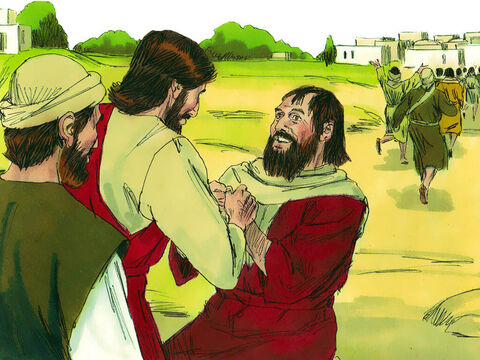
In my last course, a participant made a fascinating suggestion for a panorama for Thanksgiving. If you want to know what a panorama is, take a look at the current manual pages 24-26. Important, the page numbers change as I regularly work on my manual, just check the table of contents. Now back to this participant. She shows us that God makes it possible for us to return to fellowship with Him through Jesus Christ, not through our good deeds. Her goal: „To know and live a heart full of gratitude, remembering that all blessings are a gift from God.“ So she has created a panorama or summary of the following texts that is good to use at Thanksgiving.
Creation, Genesis 1-2,
Noah after the Flood, Genesis 7
Joseph, Genesis 47
Miriam's song of praise after the liberation from the Egyptians through the parting of the Red Sea, Exodus 15,
Daniel thanks God despite prohibition, Daniel 6
Mary's song of praise, Luke 1:46-49
Jesus gives thanks in the midst of his grief and before a miracle, Matthew 14:19
Jesus gives thanks before he raises the dead, John 11:41.42
Jesus gives thanks before he is crucified, Luke 22:17-19
Ten lepers are healed, one gives thanks, Luke 17:11-19
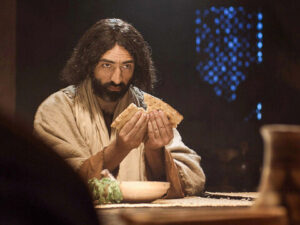
When you tell this story to Muslims, please use the following names:
Noah: Nuh
Joseph: Jusup
Egypt: Misir or Misr
Miriam, the sister of Moses: Maryam, the sister of Musa
Daniel: Danyal
Mary, the mother of Jesus: Maryam, the mother of Isa
Jesus: Isa
John the Baptist, Jesus' cousin: Yahya (pronounced Jachia)

This is the participant's suggestion:
In the beginning was the Almighty who created everything and saw that it was good. After he had finished creating he rested and set a pattern for us to rest and reflect on the good things God has given us. Unfortunately, humans did not always trust Him, and they turned from trusting Him and being thankful and disobeyed His commands. This separated man from God, yet God still pursued and loved His people. People continued to not follow God, and their disobedience became so bad, that God decided to set a great flood to kill the people He created. One man, Noah, still followed God, and God saved him and his family on a large boat. After the flood, Noah gave thanks to God. As Noah and his sons began to have descendants, many continued to not follow God, but a few followed God and gave thanks to Him seeing that all they had was a gift from God. Joseph had eleven brothers who hated him. They sold him to traders in a far away land, and he ended up in some very hard circumstances. When a famine hit the land, Joseph ended up saving his family from death. He thanked God for his terrible circumstances knowing that though his brother wronged him, God used these circumstances for good. Many years later, God’s people were slaves in Egypt when God delivered them into freedom. This included a great miracle of God moving the waters of a large sea, so the people could walk across on dry land. After they had crossed the sea, Mariam, the sister of Moses gave thanks to God for saving them. Many many years later, God’s people were again in captivity, and their captures made a law forbidding praying to anyone but the king. One man, Daniel, decided that giving thanks to God was worth whatever may happen to him for breaking the law, so he continued to pray and give thanks. Daniel was thrown into a den of lions, but God saved him from being eaten. This led to the king to write a new law saying that the people should give thanks to the God of Daniel. Yet again many years later, a different Mariam, the mother of Jesus found herself pregnant though she had never slept with a man. She knew, that she is a virgin. An angel told her that God had placed a child within her, and she was to call this child Jesus. She gave thanks to God even though she did not completely understand. Jesus became an example of thankfulness to God. When his cousin, John the Baptist had been killed and he was grieving, a crowd of 5,000 men plus women and children was gathered around him, and there was nothing to eat except five loaves of bread and two fish. Jesus gave thanks to God for the food then began to break them. Everyone was full after they ate, and there were twelve baskets of food leftover. Later a good friend of Jesus died, and Jesus went to visit the family. He then gave thanks to God that God always hears him. Jesus then tells his friend, who was already buried, to come out of the grave. His friend was alive! Now, many people did not like that Jesus was teaching people, doing miracles, and even raising the dead, so some people were plotting to kill him. Jesus knew that one of his closest friends had betrayed him. When Jesus sat down for a special meal with his closest friends, he knew it was the last meal he would eat with his friends, including the one who betrayed him, but Jesus again thanked God for the meal. Soon after Jesus was taken by the authorities and killed. He didn’t stay dead though, in three days, God raised Him from the dead. Now those who believe have so much to be thankful for that Jesus is not dead but lives. Before Jesus’s death and resurrection, he met ten men with a terrible skin condition. He told them to go show themselves to the person who could give them a clean bill of health. On the way, they were healed! One of them turned back to thank Jesus. The others did not. I want to be like this one man who turned back to thank Jesus and the other examples of people who thanked God. I have so much to be thankful for. I am most grateful that Jesus obediently trusted God and died and rose again. What are you thankful for? How will you respond in gratitude to what God has done for you?
Many thanks to the participant!
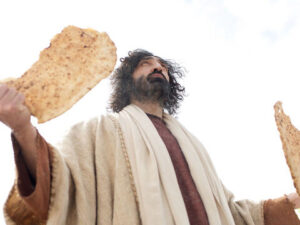
The photos are from https://www.freebibleimages.org, a free super resource for Bible photos or drawings.
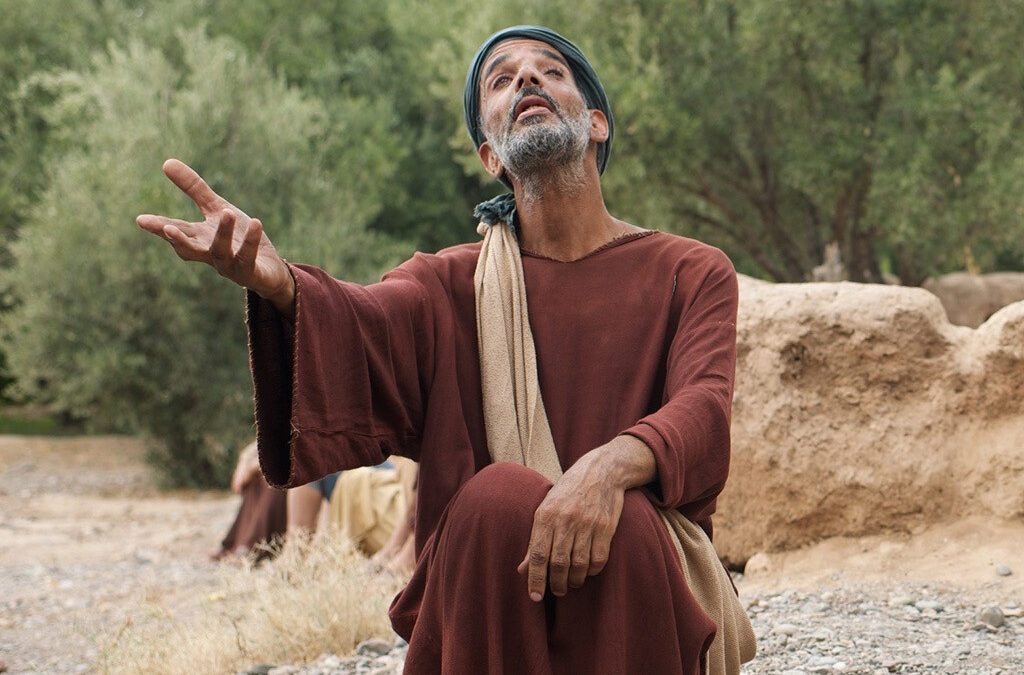
At my training courses, participants come from many different backgrounds. Once, a participant who worked at a Christian school in a deprived area (Inner city area) asked me: "Storybek, what stories are there about Jesus and inclusion?" As a reminder: inclusion means the equal participation of all people in social life - regardless of individual circumstances. To be honest, I discovered new things about Jesus' teaching. Inspired by this participant, the following set of stories was created:
The woman at the well John 4:5-19:25-30:42
Mary and Martha Luke 10:38-42 Focus: Mary as a woman is naturally part of the meeting.
Jesus and the children Luke 18:15-17
Jesus and the tax collector Luke 19:1-10
Jesus heals a blind beggar Mark 10:46-52
Antioch Acts 11:19-30+12:24-13:4a Focus: The descendants of Abraham and Greeks/Gentiles were welcome in the church.
Peter and Cornelius Acts 10 Focus: God welcomes everyone, as long as they are God-fearing and obedient to him.
Calling of the tax collector Levi Matthew 9:9-13
There are certainly many more stories that could be used. I recently heard a quote from a pastor on the radio about his congregation: "There is no place where inclusion is practiced more than in a Christian congregation. We have all ages, we have people from almost all walks of life, men and women, people with disabilities and people from different ethnic backgrounds. We are perhaps more inclusive than those who talk about it." Unfortunately, I didn't remember this pastor's name. I doubt whether this pastor is always right. The challenge remains to learn again and again what Peter also had to learn visting Cornelius: God welcomes everyone, as long as they are God-fearing and obedient to him.
In future blog posts, I will also present a story set from time to time. You can find all the material with formulated stories in my handbook "Stories and Oral Bibles" under https://www.fivefingerfood.org/en_us/download/. As my handbook continues to grow, I can only give the current page, page 250, but this will change. Otherwise, check the table of contents under "Jesus and inclusion". https://www.freebibleimages.org, a free super resource for Bible photos or drawings.
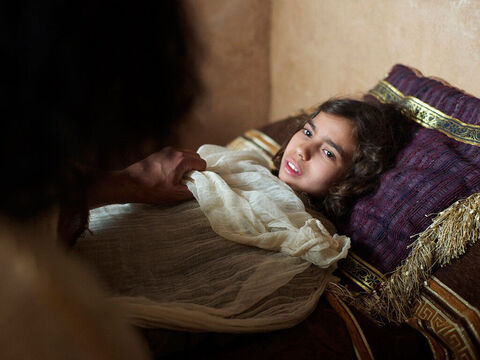
Jesus says about himself: I am life. He made this very clear through various stories and through his resurrection from the dead. It is definitely worth reflecting on the questions of death, inner and physical healing based on stories from the Holy Scriptures and trusting Jesus. In many painful things I am comforted by : "The best is yet to come!"
Death
Jesus raises the son of a widow Luke 7:11-17
Miracle for a woman and a daughter Luke 8:40-53
The authority of Jesus Mark 9:2-29
Lid: Jesus knew that he would die and that he would rise again. That is also my hope
Mary and Martha and the resurrection of Lazarus Luke 10:38-42; John 10
Resurrection of Jesus Luke 24:1-7,36-47 Matthew 28:19-20, Acts 1:8-11
Shortly before the deadline - and then still "Today!" Luke 23:39-43
Tabea Acts 9:36-43
The Future Revelation 7:9-10; 19:6-8; 21:1-6; 22:1-2.17
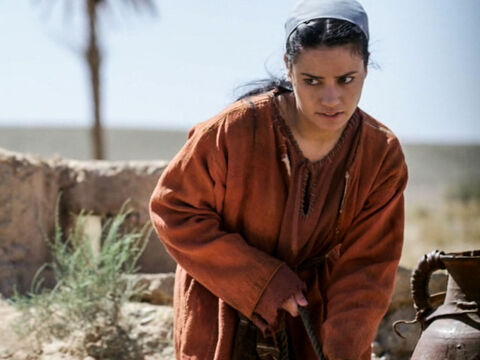
Inner healing
David and Bathsheba 2 Samuel 11:1-27; David and Nathan 2 Samuel 12:1-25
Jesus' first ministry Mark 1:14-39
The woman at the well John 4:5-19:25-30:42
The sinful woman forgiven John 8:1-11
The liberated Mark 5:1-20
The conversion of Paul Acts 9:1-18
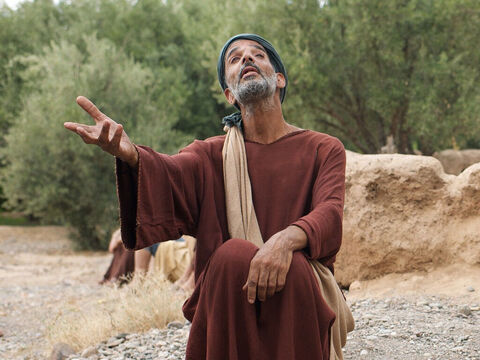
Physical healing
Jesus heals a paralytic Mark 2:1-12
The liberated Mark 5:1-20
The faith of a pagan officer Luke 7:1-10
Miracle for a woman and a daughter Luke 8:40-53
The sick man at the pool John 5:1-9
Jesus heals a man born blind John 9:1-9
Seeing the weak Luke 14:1, 7-14
Jesus heals ten lepers Luke 17:11-18
Peter and the paralytic Acts 3:1-19; 4:1-4
And more stories of healing
In future blog posts, I will also present a story set from time to time. You can find all the material with formulated stories in my handbook "Stories and Oral Bibles" under https://www.fivefingerfood.org/en_us/download/. As my handbook continues to grow, I can only give the current page, page 171 but this will change. Otherwise look in the table of contents under "Death, inner and physical healing". https://www.freebibleimages.org, a free super resource for Bible photos or drawings.
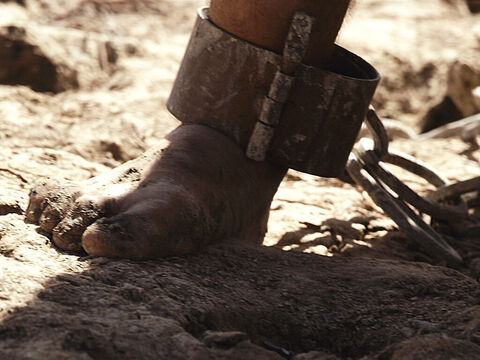
There are usually various reasons for loneliness. We therefore recommend a combination of stories from Block A and Blick
A) Think about and observe why people are lonely, why is the person you are talking to lonely?
- Loneliness due to social behavior
They are lonely because of their social behavior, such as Zacchaeus. Tell the story of Jesus and the tax collector Luke 19:1-10, lid: Jesus wants to come to you today and be your guest.
Ananias and Sapphira Acts 4, 32-35;5,1-1 Cover: Ananias and Sapphira destroyed the community with selfish motives.
- Loneliness due to psychological problems or demonic obsession
The liberated Mark 5:1-20
Lid: You are important to Jesus. He wants to set you free.
- Loneliness due to illness:
Jesus heals ten lepers Luke 17:11-18
Peter and the paralytic Acts 3:1-19; 4:1-4
The sick man at the pool John 5:1-9 Key verse: I have no one. Lid: Jesus invites you

- Loneliness due to social poverty
The rich man and the poor man Luke 16:19-31
Lid: The best is yet to come and God has the last word, not us humans. Even all the wealth won't help.
- Loneliness in prison.
The release of Peter from prison Acts 12:1-19. Cover: The church prays for the lonely.
- Loneliness, because they are victims of human trafficking and crime
Abraham, Sarah and Hagar Gen 16:1-16 and Hagar and Ishmael must leave Gen 21:1-21
Joseph-Genesis 37-50, this story has already appealed to many people
- Loneliness because of their gender or social position
Abraham, Sarah and Hagar Gen 16:1-16 and Hagar and Ishmael must leave Gen 21:1-21
Anyone using this story with Muslims should first read the section on Hagar in Islam in the article Hagar on Wikipedia. Many Muslims are familiar with the Islamic version of the Hagar story.
Ruth

- Loneliness because of being a refugee
Ruth
Idea: Jacob on the run
- Loneliness in the service of God
Elijah and God's care 1 Kings 17
Elijah on Mount Carmel 1 Kings 18
Elijah on the mountain of God 1 Kings 19:1-19
Idea: Jeremiah: The book of the prophet Jeremiah offers many possibilities
- Loneliness because the relationship with God is not right.
The story of the prodigal sons Luke 15:11-32
Cover: The younger son ran away from God the Father. The older son was always with God the Father, but he had no relationship with the father.
- B) We invite lonely people to church.
The story of the Great Banquet Luke 14:15-24
The Spirit of God Acts 2:1-47 Emphasis on what we have in common
Antioch Acts 11:19-30+12:24-13:4a
In future blog posts, I will also present a story set from time to time. You can find all the material with formulated stories in my handbook "Stories and Oral Bibles" under https://www.fivefingerfood.org/en_us/download/. As my handbook continues to grow, I can only give the current page, page 169, but this will change. Otherwise look in the table of contents under "Stories for lonely people". https://www.freebibleimages.org, a free super resource for Bible photos or drawings.
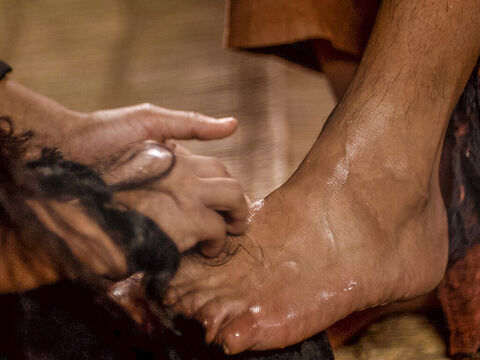
A personal highlight during my training courses is creating a story set. A story set consists of 4-10 stories, which are either told one after the other or build on each other visit after visit. A group of women once compiled the following stories with my methodical support. I later added various other things and added a panorama/summary.
Abraham, Sarah and Hagar Gen 16:1-16
Hagar and Ishmael must leave Gen 21:1-21
Ruth
Hannah's desire to have children 1 Samuel 1+2,18-21
David and Bathsheba 2 Samuel 11:1-27
David and Nathan 2 Samuel 12:1-25, the two stories belong together
Job's wife
A song of praise for the energetic woman Proverbs 31:10-31
Mary and Martha and the resurrection of Lazarus Luke 10:38-42; John 10, you can also focus only on the first story, emphasis on Martha is not focused.
The woman at the well John 4:5-19:25-30:42
The woman who anointed Jesus Luke 7:36-50
Miracle for a woman and a daughter Luke 8:40-53, you can also leave out the part about the raising of the daughter
The unshakeable faith of a foreign woman Matthew 15:21-28
Women as witnesses of Jesus' death and resurrection Luke 23:26-56, Mark 16:1-7, Luke 24:36-47
Priscilla
Panorama of how women encounter God
Ideas:
Isaac & Rebecca's relationships influencing Esau & Jacob Genesis 25:19-34; 27; 28
Rachel & Leah's struggle for the love of a man Genesis 29; 30:1-24;
Jacob's preferential treatment of his children Genesis 38
In future blog posts, I will also present a story set from time to time. You can find all the material with formulated stories in my handbook "Stories and Oral Bibles" under https://www.fivefingerfood.org/en_us/download/. As my handbook continues to grow, I can only give the current page, page 233, but this will change. Otherwise, check the table of contents under "Marriage and Family Focus: How God meets women" The photo was taken by https://www.freebibleimages.org, a free super resource for Bible photos or drawings.
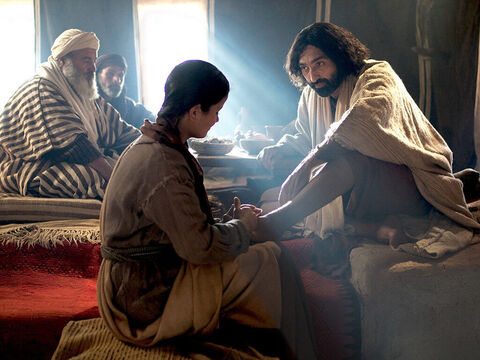
Panorama of how women encounter God
In the beginning, God created man and woman in his image and likeness. They had a perfect personal relationship with God until they disobeyed God, the relationship broke down and disobedience and sin entered the world. Despite our imperfect and sinful lives, God wants to restore this relationship with us. He desires a personal relationship with you and wants to meet you in every phase of your life. He sees you and loves you. We see this so often in Scripture, where true stories show God's true love for us.
Let me give you a few examples. Hagar, a maidservant of Sarah and Abraham, gave birth to Abraham when Sarah was unable to have a child. That is why she was sent to a foreign land, and it was very difficult for her. God heard her cries and saw her pain and blessed her and her child.
We also see in the story of Hannah how she wept year after year and begged God to bless her with a son because she had no children. Although she and her husband were very religious, they remained childless. One day, Hannah promised God in prayer that she would give him a son if he gave her one. God answered her prayer and blessed her with a son.
Then God sent Jesus as our Savior to show us the true way to God. He was born of the Virgin Mary. God sent angels to tell Mary and her fiancé Joseph who Jesus was. Although she was afraid, she trusted that God would take care of her. After Jesus' birth, many people came to see him, but the king at the time wanted to kill him, but God protected Mary and Joseph with the baby Jesus.
Jesus came and performed many miracles and forgave sins to point us to God. There was a woman with a hemorrhage whom no doctor had been able to help for 12 years. But when she heard that Jesus was in town, she pushed her way through the crowd, touched the hem of his garment and was instantly healed.
In another story, a woman who had been caught in the act of adultery was brought before Jesus. The religious leaders were determined to condemn the woman and stone her to death. Although according to the law both the man and the woman were to be condemned, only the woman was brought to be stoned. Jesus said to the group: "Let him who is without sin among you cast the first stone. None of them could throw the first stone, so each of them went, starting with the oldest. Jesus said to the woman, "None of your accusers has remained, and I do not condemn you; go in peace and sin no more."
In another situation, when Jesus was in the house of a religious leader and everyone felt uncomfortable, a sinful woman came to Jesus. The woman had a bottle of expensive perfume with her and poured it on Jesus because it was traditional to anoint and honor him with it. The woman wept at Jesus' feet because she had so much sin in her life and only Jesus could forgive her. The crowd was amazed at her behavior, but Jesus said to her: "Your sins are forgiven. Your faith has saved you.
I like these true stories because Jesus came to give the unseen the feeling of being seen and the unheard the feeling of being heard. He came to heal us physically, emotionally and spiritually by taking away the burdens and sins that separate us from God. He is the Savior who had to die for our sins, rose from the dead and can establish a personal relationship with God in his name. He invites us.
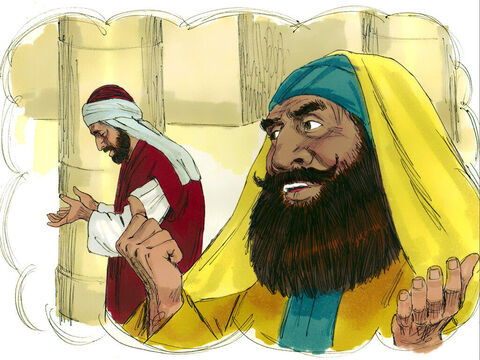
Again and again I am asked how to share the "Good News" with Muslims using a simple set. This is a suggestion as a starting point. Please remember that you can always adapt such a set to suit the person you are talking to or the target group. If you have half an hour or a whole hour, for example, you can tell them all one after the other. Just as often, however, I only tell one or two stories in several different conversations. You will find all of the following stories ready to download in my handbook "Stories and Oral Bibles". As the numbering changes over time, please go to the table of contents and search for "Story set for Muslims", at the moment it is no. 106
A conversation starts by building a relationship, you get to know each other briefly, talk about Islam and fasting. Then I ask the question: "Can I tell you an interesting story about fasting from the Prophet Isa?" I tell the story in simple German: Two men praying Luke 18:9-14. Many people will know the story under "The parable of the Pharisee and the tax collector in the temple". Depending on the situation, I use the following as a cover or personal confession: "So I also believe that Jesus answers my prayers for forgiveness of my guilt. What do you think about that?" Or: "I am glad that Jesus sees my heart! How do you see that?"
If there is plenty of time, I will use the following story as the next one "The first disobedience against God Genesis 3:1-24". I emphasize afterwards that because of a single disobedience, the personal relationship with God has been destroyed to this day, even for us humans today. How can I manage to become righteous before God with good deeds?
Then I tell Abraham Genesis 12:1-7; 15:1-6. Lid: I am happy that I have a personal relationship with God, that I talk to him like with a family member. What does that look like in your life? Do you also have such a personal relationship?
Next story: God puts Abraham to the test Genesis 22:1-19. "Who provided the sacrificial lamb?" Muslims almost always answer that the sacrifice was given by God. This is then the template for the next story.
The deliverance of Abraham's descendants by Moses Exodus 12:1-33, Deuteronomy 18:15
Again and again I come across postmodern Muslims who say that all religions lead to God. That's why I have the following lid: only those who were in the house and under the protection of the blood were spared from judgment. It was no use saying, "I am an Egyptian who says all religions lead to God." "Remember, God makes the rules not you. What do you think about that?"
Now comes the Message of Hope Isaiah 52:13-53:12. A very brief summary of this story is recommended here. Again the question: What do you think about it?
As the last or penultimate story I use Jesus' baptism Luke 3:1-3, 10-22 Matthew 3:7-9, 13-15, John 1:29. I end the story with the cover: "I believe that Jesus is the sacrificial lamb of God who died and rose again as a sacrificial lamb for my disobedience, just as our common prophet Jachia (Arabic name for John the Baptist) said. What do you think about this?" You have to realize that this can come across as a serious provocation. Here you can see who is a seeker and who is not.
I use as a finish: The story of the prodigal sons Luke 15:11-32
Lid: "I believe that God welcomes us like a father welcomes his son. What do you think about this story?" Due to time constraints, the second part of the story about the second son can be omitted.
I always use stories to filter out who is really interested in spiritual conversation. "Who is seeking?" Anyone who has listened so far may find it worthwhile to spend a lot of time with more stories.
All stories are formulated in my manual and come with lots of tips. Especially for a storyteller with not so much experience, it can be worth learning and retelling a story every week.
I will also be introducing more story sets in my next blog posts, so it's worth coming back to the blog. A warm invitation to my Training in German and English.
Finally, a helpful table with Arabic names that I like to use in my stories:
Arabic Bible part names
When talking to Muslims, it is recommended that the story is concluded with the sentence: This story is really true and it is written in the Taurat/Zabur or Indshil.
| English |
Arabic |
| History books of Moses |
Taurat |
| Psalms/Wisdom literature |
Zabur |
| New Testament |
Injil |
If you want to know which biblical stories appear in the Koran and how, go to https://en.wikipedia.org/wiki/Biblical_narratives_in_the_Quran
Arabic terminology
When talking to Muslims, it can be very helpful to use the Arabic names of biblical characters. For example, John the Baptist is called Yahya in Arabic. Yahya is important to many Muslims, but they do not know John the Baptist. The table also lists other important names that do not appear here.
| English |
Arabic |
| Abel |
Habil |
| Abraham |
Ibrahim |
| Adam |
Adam |
| Egypt |
Misr or Misir |
| Evil spirit / unclean spirit |
Jinn |
| David |
Dawud |
| Elia |
Ilyas |
| Eva |
Hawa (pronounced Hauwa) |
| James (Latin form of Jacob) |
Jakub |
| Isaiah |
Aschaja or Schaja |
| Jesus |
Isa |
| John the Baptist |
Yahya (pronounced Jachia) |
| Joseph |
Jususf |
| Cain |
Qabil |
| Mary |
Maryam |
| Moses |
Musa |
| Noah |
Nuh |
| Solomon |
Suleiman |
| Samuel |
Samuil |
| Samaria |
El-sa-mi-ria |
| Satan |
Shaitan |
| Impure spirit/evil spirit |
Jinn |















Recent Comments